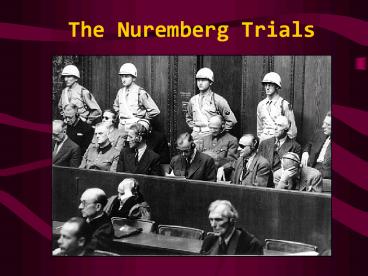The Nuremberg Trials - PowerPoint PPT Presentation
1 / 12
Title:
The Nuremberg Trials
Description:
Nazi Germany s unconditional surrender Hague ... Atrocities part of govt policy, not just individuals. Ensure the German people knew what had happened. – PowerPoint PPT presentation
Number of Views:198
Avg rating:3.0/5.0
Title: The Nuremberg Trials
1
The Nuremberg Trials
2
The End of WWII
3
What next?
De Gaulle
Truman
Churchill
Stalin
- Already decided at the Teheran Conference in Nov
1943. - Procedures set out by London Charter of the
International Military Tribunal (Aug 1945) To
bring to trial and punish the major war
criminals of the Axis countries
4
Why?
- Needed to make an example of Nazi leaders for a
variety of reasons - Atrocities part of govt policy, not just
individuals. - Ensure the German people knew what had happened.
- Hope that the example made would ensure no
further repeats. - Give the United Nations a reputation for morals.
5
The Nuremberg Trials
- The Nuremberg Trials was the name given to a
series of trials that prosecuted prominent
members of the political, economic military
leadership of Nazi Germany. - One major twelve subsequent trials.
- Only Germans were prosecuted. Why?
- Russia was one of the Big Three Allies
- Italy had ended the war as an Allied nation
- Japan dealt with separately
- They lost!
6
The Nuremberg Trials
- The first Trials began October 18, 1945 with
defendants charged with one or more of the
following - Conspiracy or participation in a common plan
to commit crimes against peace. - Crimes against peace (planning, initiating
waging wars of aggression) - War crimes
- Crimes against humanity
- The Charter stated that holding an official
position was no defence to war crimes. Obedience
to orders could only be considered in regards to
mitigation of punishment if the Tribunal
determined that justice so required.
7
(Some of) The Accused
Jodl
Hess
Bormann
Goring
Speer
Kaltenbrunner
Von Papen
Krupp
8
Results
SHORT TERM It saw the death and incarceration of
21 German major war criminals
Julius Streicher
Nuremberg Trials Defendants in their dock. The
main target of the prosecution was Hermann Göring
(left on the first row), considered to be the
most important surviving official in the Third
Reich after Hitler's death.
LONG TERM It set the precedent in International
Law for crimes against humanity
9
The Legitimacy of the Trials
- History is about winners, not about losers.
- History is about assessing distortions, not
copying out truths. - History has much to say about the way the
powerful handle power, for power endangers
records. - History is about evidence, and evidence
flagrantly distorts. There is a bias between
winners and losers. - History is hopeless on love, but excellent on
hatred. Such a state of things may not please
all, but then history was never meant to please. - History Extension Source Book of Readings (NSW
Board of Studies)
10
The Legitimacy of the Trials
- What gave the trials legitimacy?
- Nazi Germanys unconditional surrender
- Hague (1899 1907) Geneva (1925) Conventions
on the conduct of warfare - Kellogg-Briand Pact 1928
- Punishments varied according to guilt.
11
The Legitimacy of the Trials
- What made the trials illegitimate?
- Article 3 Neither the Tribunal, its members or
their alternates can be challenged by the
prosecution or by any of the defendants, at any
time. - Article 16A During any preliminary examination
or trial of a defendant, he will have the right
to give any explanation relevant to the charges
made against him but he cannot make an appeal. - Article 19 The tribunal shall not be bound by
the technical rules of evidence. The tribunal may
admit any evidence which it deems to be of
probative value - Article 26 The judgments of the Tribunal shall
be final and are not subject to any future
review.
12
The Legitimacy of the Trials
- What made the trials illegitimate?
- Crimes defined after they were committed
- Victors justice
- Same rules did not apply to Allies (eg.
Nazi-Soviet Pact, bombing of Germany, Katyn, etc)
therefore, double standards































